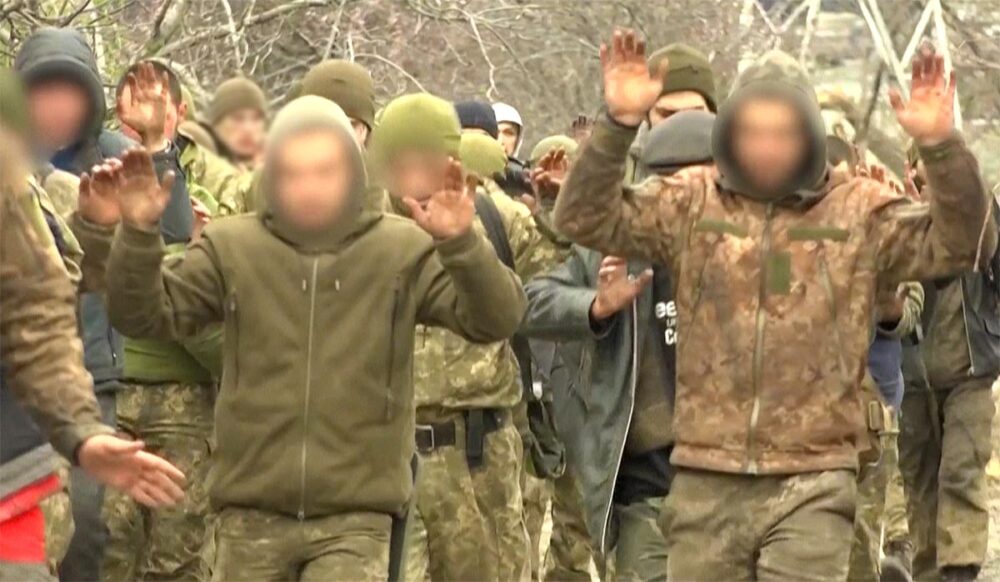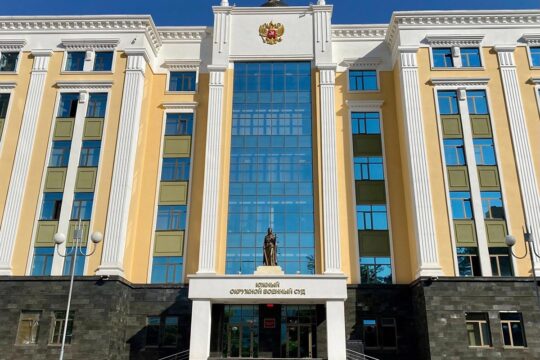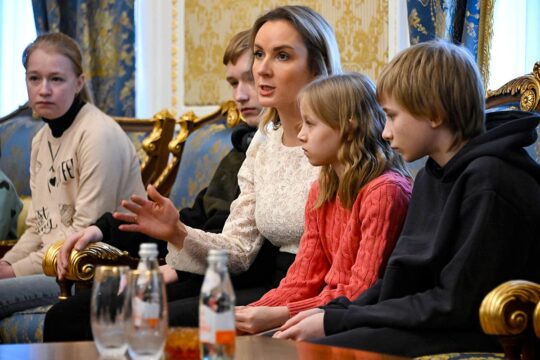Since the beginning of August, the Supreme Court of the Russia-occupied Donetsk People's Republic (DNR), in Eastern Ukraine, has remarkably accelerated the review of cases involving Ukrainian military personnel. Since August 1, verdicts have been issued for 118 prisoners of war, with only 15 cases being conducted in absentia (without the presence of the accused). In all other instances, the accused were present in court, the overwhelming majority admitting guilt – at least, Justice Info found no reports of defendants denying their culpability.
Justice Info tallied the number of cases based on information published in Russian state news agencies, military Telegram-channels, and the websites of Russian law enforcement agencies. Despite the fact that Russia has considered the DNR its territory for more than a year, the courts in the so-called republic have not yet transitioned to the Russian automated system called "Justice". This system operates in courts across Russia, enabling the online tracking of case filings, scheduling of hearings, and information on participants.
Due to this, it is not possible to verify whether all verdicts for Ukrainian prisoners of war have been publicly disclosed and to understand how many more cases are currently under the court's consideration. In May of this year, the head of the Russian Investigative Committee (one of the Russian law enforcement agencies responsible for initiating and conducting investigations into most articles of the Criminal Code) Alexander Bastrykin mentioned the initiation of over 2,900 criminal cases against 716 individuals in connection with crimes committed in Donbas, linked to the war in Ukraine.
Marines handed life sentences
At least 15 Ukrainian soldiers have been sentenced to life imprisonment. In all cases, the criminal prosecutions stemmed from events that occurred in Mariupol and its surroundings in the spring of 2022.
The battle for Mariupol began on February 25, the day after the start of the full-scale Russian invasion of Ukraine. On March 2, Ukrainian forces in Mariupol found themselves surrounded. On April 13, the besieged 36th Marine Brigade of the Ukrainian Armed Forces attempted to break through at the Ilyich Metallurgical Plant. As a result, some fighters reached the territory of the "Azovstal" industrial complex, while others were captured. On May 16, the fighters located at "Azovstal" also surrendered. Since then, the city has been fully under Russian control.
Among those sentenced by the DNR court in the last four months, a significant number are indeed marines. Those who’ve received a life sentence included a serviceman from the 23rd Marine Guard Unit of the State Border Guard Service of Ukraine Denis Gangala, a radiotelephonist from the 36th Marine Brigade Igor Taran, a driver from the same unit Andrei Skorina, and the commander of the 2nd platoon of the 501st Separate Battalion of the 36th Marine Brigade Leonid Onupko. The latest on record is Alexander Svinarchuk, who was sentenced on November 21.
Like other defendants, they were accused of cruel treatment of the civilian population, using prohibited methods of warfare in an armed conflict, as well as killing civilians based on political or ideological hatred. For instance, platoon commander Onupko was found guilty on October 16 of giving orders to execute 10 civilians between March 15 and April 4, 2022. According to Russian investigators, he issued these orders from the "Sadik" outpost, located in a former kindergarten on Yasnopolyanskaya Street in Mariupol. Onupko's subordinates at checkpoints were accused of detaining local residents suspected of assisting Russian soldiers and providing the information to Onupko. Onupko then allegedly reported the detainees to the brigade command, which would typically order their execution. Onupko relayed this order to his subordinates for implementation, the prosecution alleged.
During another court proceeding, sniper Igor Kleshchunov from the 501st Separate Battalion of the 36th Separate Marine Brigade, who served under Onupko's command, confirmed the existence of such orders. On November 7, the Supreme Court of DNR sentenced Kleshchunov to life imprisonment, finding him guilty of the execution of four civilians. In a video released by the Russian Investigative Committee, when asked, "Do you repent for what you've done?" he responded, "Yes sir." The official statement from the Investigative Committee, as well as reports from state news agencies, did not provide information on the specific evidence presented by the prosecution during the trial.
Special regime for special prisoners
In accordance with Russian legislation, those sentenced to life imprisonment are typically required to serve their sentences in special regime colonies. In general Russia has three types of prison regimes: general, top-security, and special. The fundamental distinction of the special regime is that inmates are housed in individual or sometimes small group cells, whereas in other colonies, they live in dormitories. There are only eight special regime colonies for life-sentenced individuals in the entire country; others are designated for repeat offenders.
Dmitry Gurin, a legal advisor at the European Prison Litigation Network, an NGO, believes that, with a court verdict, the Russian authorities can justify the choice of the place of imprisonment based on the norms of the national Criminal Executive Code rather than the Geneva Conventions because "the convicted criminal is now before them, not a prisoner of war." The Criminal Executive Code of the Russian Federation, in turn, provides the Federal Penitentiary Service with essentially unlimited discretion in determining the place of punishment, according to Gurin. Currently, Russia does not disclose information about the specific prisons where the convicted prisoners of war will be sent.
The only individual who received a life sentence in absentia is a serviceman of the "Azov" Regiment of the National Guard of Ukraine, Mykola Kushch (call sign “Frost”). According to the Russian Main Military Prosecutor's Office, in mid-April 2022 Kushch shot a serviceman of DNR’s People's Militia in Mariupol. After the shooting, he allegedly took a weapon, flipped the DNR soldier onto his back, and shot him in the head.
According to the investigation, Kushch himself recorded the moment of the murder on a camera attached to his helmet and then posted it "in one of the Telegram channels," where he was an administrator. In July 2022, a tribunal in the DNR had already sentenced him for a similar crime. At that time, the self-proclaimed republic had its own legislation, and Kushch was sentenced to death penalty. However, the sentence was not carried out. In September 2022, he, along with 214 other Ukrainian soldiers, was exchanged for 55 Russian servicemen and pro-Russian politician Viktor Medvedchuk. In late October, “Frost”, along with other "Azov" fighters, gave a comprehensive interview to a Ukrainian journalist, where he mentioned his return to the front lines.
Pro-Russian views as “political hatred”
Another 104 prisoners of war were sentenced to terms ranging from 12 to 30 years. Ninety military personnel attended the court proceedings in person, with only 14 cases conducted in absentia. The majority of the defendants were members of the 36th Marine Brigade, the "Azov" regiment, or the 56th Separate Motorized Infantry Brigade. The servicemen were accused of cruel treatment of the civilian population, the use of prohibited means and methods in armed conflict, as well as murder based on ideological or political hatred.
Typically, the formulation "based on ideological or political hatred" in these cases essentially meant "antipathy towards pro-Russian views." Ukrainian soldiers were allegedly killing those who supported Russia in the conflict. For instance, on November 1, the DNR’s Supreme Court sentenced Border Guard inspector and Azov regiment staff sergeant Sergey Rostovsky to 26 years of strict regime imprisonment. According to the investigation, in late March 2022 Rostovsky patrolled an area at one of the intersections in Mariupol. During that period, the investigation claims he was obstructing the free movement of the civilian population, and those who did not follow instructions or "supported the special military operation or assisted the armed forces of the Donetsk People's Republic" were killed.
The accusation attributed one such episode to Rostovsky. On March 26, on the street he patrolled, he allegedly noticed two people whom he presumed supported Russia’s "special military operation," provided assistance to the armed forces of DNR and Russia, or held pro-Russian positions. Rostovsky reportedly fired at least seven deliberate shots from an AK-47. The victims turned out to be a married couple of healthcare workers. The Investigative Committee does not specify how Rostovsky determined that they held pro-Russian views as it did not specify what evidence was provided in court. In a video published by the Russian investigation, Rostovsky said that he "deeply regrets" his actions.
One case of rape
In some cases, the Investigative Committee of Russia has also accused Ukrainian soldiers of intentionally damaging others' property. This charge is present in the case of the commanders of mortar units Lieutenant Yevgeny Zemlyak, Sergeant Yuri Dmitriev, and Sergeant Pavel Kurchenko, who served on a contract basis in the "Azov" regiment. They are accused of repeatedly shelling the village of Kalinovka in the Novoazovsk district of Mariupol, without military necessity, motivated by a "sense of hatred towards the local population for what they perceived as a pro-Russian stance." The court sentenced them to 23 to 24 years in prison, but in absentia.
One of the convicted individuals, deputy commander of the Fire Support platoon within the 36th Marine Brigade, Senior Lieutenant Sergey Batynsky, was found guilty of rape. According to the investigation, in early April 2022 Batynsky's fellow servicemen detained a couple in Mariupol and confined them to a basement. On April 8, Batynsky allegedly entered the captives' room, threatened the woman to kill her, and sexually assaulted her. Later Batynsky allegedly shot her husband dead. The Russian Investigative Committee stated that they conducted a reconstruction of the crime, where "Batynsky detailed how he committed the crimes." The Ukrainian military officer pleaded guilty and was sentenced to 25 years in prison.
Added value in prisoners’ exchange?
The significant increase in the number of new verdicts issued by the DNR’s Supreme Court is associated with the enactment of the law on Russian criminal jurisdiction in annexed territories, believes Dmitry Gurin. Russia’s president Vladimir Putin signed the document on July 31, 2023, after it had been under consideration in the State Duma (Russia’s parliament) since December 2022, which is quite a lengthy period for such "military" legislative bill.
The adopted law stipulates that military tribunals in Donetsk and Luhansk (LNR) can operate "as before," but now under Russian jurisdiction. Alongside this clarification, the document includes other provisions, such as a waiver of criminal prosecution for any crime committed "in defense of the interests of the Russian Federation." Such indulgence is granted for actions taken in the occupied territories until September 30, 2022.
"The activity of the courts in the occupied territories initially had slowed down — evidently, they were waiting for directives from Moscow," suggests Gurin. "With the enactment of this law, the courts have resumed. The document essentially gave the green light to the courts: business as usual but guided by Russian law, meaning without death penalties (at least for now) and following the rules of the current criminal procedural code." Gurin explains the severity of the sentences by the fact that officials from the occupied territories want to curry favor with the “new leadership”.
Prisoners of war can be held accountable, but only for specific crimes, not abstract participation in military actions. In Russian legislation, such a norm is defined as "the use of prohibited methods of warfare". But according to Gurin "even if we assume that the accusations in the cases under consideration are substantiated, it doesn't matter: from the perspective of international law, Russian tribunals in the so-called LNR and DNR are not courts legally established, and therefore their decisions are legally null and void." Gurin believes that Russians are mostly using these verdicts to raise the stakes in the exchange of prisoners of war with Ukraine.







